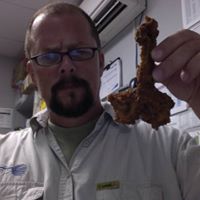Leaderboard
Popular Content
Showing content with the highest reputation on 08/25/2012 in all areas
-
You believe in aerial spraying of Prozac... You believe the waiting room water fountain should be fitted with a valium proportioner You have ever reffered to a new ED Doc as a shit magnet You have ever eaten chocolatte pudding out of a chux to see if you can make the new resident puke You have ever had a patient look you directly in the eye and deny any knowledge of how some foreign body came to be in some orifice of their body You have ever asked a patient if she is sexually active and she answered "No I just lie there" You believe chocolate is a food group... You refer to vegetables and are not talking about a food group... You believe a good tape job will fix anything... You disbelieve 90% of what you are told and 75% of what you see... Your idea of comforting a child includes placing them in a papoose restraint... You believe that "shallow gene pool" should be a recognized diagnosis... You believe that the government should require a permit to reproduce... You believe that unspeakable evils will befall you if the phrase "Wow, it's really quiet" is uttered... You threaten to strangle anyone who even starts to say the "q" word when it is even remotely calm... You are totally astounded when someone on a convalescent home's staff is understandable... You say to yourself "great veins" when looking at complete strangers ... You have ever referred to someone's death as a "Celestial Transfer"... You have been called out on a police tactical response and the call turned out to be for a shooting pain... You refer to someone in severe respiratory distress as a "smurf"... You have ever wanted to hold a seminar entitled "Suicide...Doing It Right"... You have ever had to leave a patient's side before you begin to laugh uncontrollably... You think that caffeine should be available in I.V. form... You have ever restrained someone and it was not a sexual experience... Your most common assessment question is "what changed tonight to make it an emergency after 6 (hours, days, weeks, months, years)?"... You carry your own set of keys to the "leathers"... Your idea of gambling is an blood alcohol level pool instead of a football pool... Your bladder expands to the same size as a Winnebago's water tank... Your feet are slightly flatter and tougher than Fred Flintstone's... And finally: You might be an EMS professional if you find any of this funny!3 points
-
Really hoping I can share my story and hoping to get some advice and answers. I appreciate the time in advance. I received my EMT license in 2009, and then decided to join the Army. After I joined, I got a "dui" I say it like this because I am still unsure of exactly what it labels as on my record... I never had to pay any fees, just took an online course and mailed in the certificate. My license was however suspended for a year. I remember back in class, the paramedics stressing about suspended licenses but I don't remember what exactly was said. Now I am deployed, and my license has expired, but I have had confirmation that there is an exception for active duty military members. I am about to get out of the army and would really like to pursue the career I had intended on all along. However I am nervous that I will not be able to get an ambulance license due to my suspended license. I have talked to a friend who is currently working as an EMT and he says his company will not hire until 10 YEARS after a suspended license.. well that is a long time from now. I have a back up plan in case I will not get hired. I just want to know before I get off active duty, so I'm not setting myself up for failure. I got my license and the dui in California, but If I were to get an ems job it would be in NY or anywhere else the army sends my husband and I. Thank you1 point
-
I find my self in an interesting situation as an educator. I am not spending much time in the field doing direct patient care. Over the past year I have only spent about 400 hours in the hospital doing direct patient care. It is a 255+ bed hospital with a 20+ bed ER and a 40 bed medical/surgical ICU that specialises in post cardiac (PCI & CABG) care. In addition, I did about 150 hours of community health clinical rotations for a degree that I am completing. The hospital time has me spending about half of it in the ER and about half in the ICU working with paramedic students. We are able to perform to the full scope of practice allowed in the state and we also get to work with ventilators, balloon pumps and invasive lines along with medication infusions in the ICU (I know several of the RT's and several of the nurses quite well, so we are able to do allot.). My point being, how little clinical experience is too little? I feel fairly confident in my patient care abilities and still perform patient assessment and care including placing IV's and so on; however, I worry about loosing my ability to be an effective provider. While I assume there is no magic number, are you guys aware of any evidence on the optimal amount of patient contact time and performance of procedures? For example, I was doing several IV's a day during my full time ER days and now I am only doing 3-4 per week. So, what do you all think?1 point
-
I have an interview coming up and I really want this job so I am asking for any pointers. The job was advertised, wanted: ED Tech, requirements: EMT training, job description: will be responsible for helping pt. with insurance forms and further paperwork (not a lot of pt contact) I will be the first paramedic they have considered for this position. I would like to point out how my skills would be very useful (working with Pt.) Any ideas?1 point
-
Hello ladies and gentlemen: I am a new AEMT student. I want some more advanced skills and preparation for medic school, and I felt this would be a good step before applying to schools. That being said, I have some questions about the practicality of being an AEMT in Colorado. Any Colorado residents have any idea if there are even AEMT JOBS in Colorado? From what I hear (rumors from the rabble at school) I will not have any AEMT protocols to work under in this state, and I will effectively be an EMT.1 point
-
http://www.nytimes.com/2012/08/26/science/space/neil-armstrong-dies-first-man-on-moon.html?_r=1 May he rest in peace...He got to do what a lot of us dreamed about not once but twice...he has taken a walk through the stars.1 point
-
If you noticed, MSNBC was reporting for nearly two hours that his name was Neil Young. I don't get too into calling actors "famous", I consider a person famous if they made a cultural impact on more than one generation of Americans. That said, a lot of famous people have been passing away lately. Mr. Armstrong definetly made a cultural impact on the globe.1 point
-
Hi all, my name is Mike and I wanted to introduce myself. I have been lurking on this site for a few months (several of you unknowingly helped me through my EMT class, lol) and finally decided to join. I am a former cop and private investigator who decided to follow my dream and go into EMS. I took a class through AMR this year and recently got certified. I currently work for a private ambulance company and am immensely enjoying my new career.1 point
-
There are many other options in the medical field besides EMS. If you are really interested in healthcare work, by all means, don't be discouraged and go for it.1 point
-
Maybe not; the techs that I speak of have different areas of focus. Some simply gather patient information and perform ECG's all day and others are involved with direct patient care. I am not quite sure of the exact definition and responsibilities of the OP's prospective position. However, if the pay and benefits are better than what an ambulance in his/her area could offer, I would not fault the person for considering the position.1 point
-
Ask ArcticKat to tell the story about his local fire chief. Dwayne, I've worked with "professional firefighters" in multiple states. While I can't say that drinking on the job is a common occurrence, it occurs with much more frequency than I ever thought. Not all places are bad. Some are worse than others. But it's pretty scary. ETA: Volly houses are worse from what I've seen. It's not uncommon to keep alcohol in house if there is a banquet hall on site as well. It's all part of their fund raising efforts.1 point
-
1 point
-
Without trying to sound crass, you remember in grade school when they talked about this going on your permanent record? They weren't kidding. This is one of those times. Even though you got your license back it'll be years before you could reasonably expect to get hired to work in EMS. Driving is an important part of the job. Being able to insure those driving is what lets us get out on the road in the ambulance. A DUI pretty much guarantees that you will be uninsurable by anybody worth working for for many years to come. If EMS is really what you want then make it a long term goal while you're working on your back up plan. Long term it is still a possibility. Short term you're screwed as far as EMS goes.1 point
-
While I do understand the OP's concern for their legal risk on both sides of this equation, I also would offer this opinion. Drug abusers', whether wearing an EMS, Police, Fire, RN, MD, uniform or filthy rags of a homeless person are at their very core drug abusers. No more, no less. Due to the "professional's" access to pain medicine, it makes for a very tempting environment to either steal or divert narcotics to themselves. News media of all forms are replete with seemingly countless examples of prescription med theft and instances of providers "diverting" or stealing narcotics through the practice of removing narcotic meds from vials and replacing it with 0.9% NaCL. In the example offered by the author, it is apparently uncontested that the student has a drug problem. From my perspective, the next time this person presents to class in an apparently intoxicated state, the instructor should contact security and have them removed from the class. Of course college policies must be adhered to implicitly. Once the student is removed from the classroom I would recommend insisting on a drug test to include hair analysis and a urine drug screen. Be very careful in allowing someone you believe intoxicated to drive. You could be exposing yourself to liability. If they insist on driving, call law enforcement. A policy containing the following would be helpful, along with requiring all students to sign a "Drug Free School" agreement. If the students tests positive, they would then be required to produce a prescription validating the reason the substance was in their system. Those without a valid reason for being intoxicated with the substance would be given one opportunity to "come clean" about their drug use / abuse. Dishonest individuals must be discharged from the course for violation of the drug free school policy. Honest students would be referred to the college version of he EAP for counseling and rehab services. Following completion of these services the student would be responsible for payment of periodic and unannounced drug screening to remain in the class. Any positive test would result in immediate dismissal from the program. Remember, regardless of who they are, drug abusers are not rational when needing access to the substance of their desire. Normally professional individuals have and will do virtually anything to satisfy their desire for the substance they are addicted to. This includes stealing meds from cancer patients, stealing meds from anyone they can, including patients they encounter in the clinical environment. It is your job and your responsibility to protect the patients from these individuals at all costs. Clinical Contracts / Agreements are precious to EMS Educators. If just one of your students is stupid enough or addicted enough to violate the trust afforded them by being allowed in this environment, it will be as if they opened Pandora's box. I promise you, if this happens, hell will pour out of it and your clinical agreements will vaporize overnight, and so will your career as an educator if you haven't shown "due diligence" in attempting to prevent the occurrence.1 point
-
The "number needed to treat" reflects the number of patients that will receive a treatment in order to create one good outcome. Few treatments benefit every patient who receives them. For example, cholesterol lowering drugs are known to help prevent heart attacks, but not 100% of the time. You will have to give hundreds of people the drug before you can say you have prevented one heart attack. A NNT of 1 means that everyone who receives the treatment lives, and everyone who doesn't (the controls) dies. For the spinal study, you have to immobilize over 1000 patients before you could theoretically prevent one bad outcome (doubtful that backboarding would even do so). The "number needed to harm" is the same concept, only looking at bad outcomes. Say a treatment is very toxic, and there is a 5% mortality rate caused by the drug. For every 20 patients who receive the drug, one will die, therefore the NNH is 20. In the spinal immobilization study, you would only immobilize 66 people before you caused a bad outcome. Taking the above numbers into account, if you immobilized 1032 patients with penetrating trauma, you might prevent 1 bad outcome, but cause bad outcomes in 15 others. More on this calculation: http://en.wikipedia.org/wiki/Number_needed_to_treat A "distracting injury" is theoretical. The idea is that if you have a painful enough injury, such as a femur fracture or rib fracture, it may focus your mind so that you do not feel the pain in your neck from a spinal fracture, and you should therefore be immobilized until x-rays are performed. What the study showed was that of these patients with confirmed spinal injuries, 87% of them had other injuries that would meet their definition of potentially distracting. What they found was that even with these other injuries, all but 4 of the patients still had pain and tenderness in their neck. Of the 4 that did not, all 4 had tenderness and bruising of the anterior chest. It calls into question the theory of a distracting injury that would require x-rays of the neck on a patient who has no neck pain, or perhaps we should better define a distracting injury to include anterior chest tenderness. 'zilla1 point
-
I won't answer your question for you but will ask you this: Do you think it's wrong to be a caring, compassionate provider?1 point









